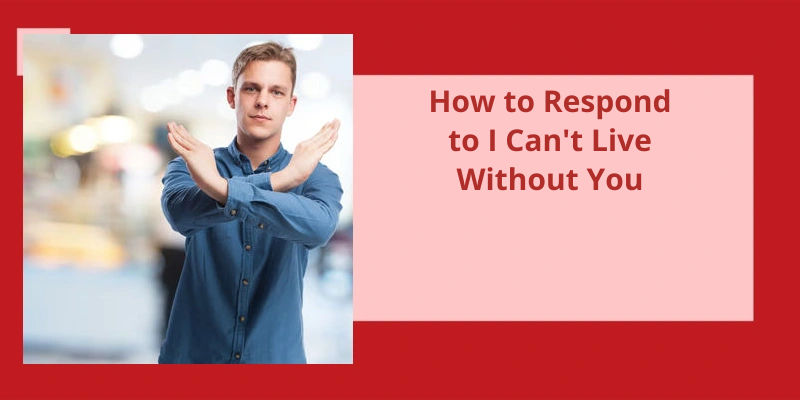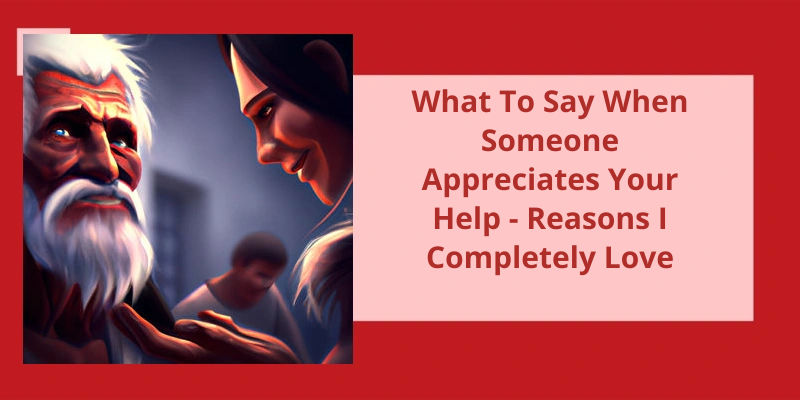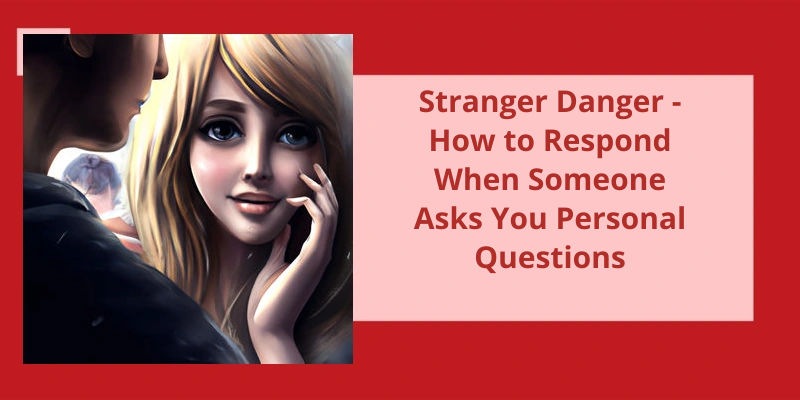When someone, whether it be a friend, partner, or family member, says to you, "I can't live without you," it can be a daunting and overwhelming statement to respond to. It may take you by surprise, leaving you unsure of how to react or what to say in return. However, it's crucial to handle this situation with care and sensitivity, considering the impact your response can have on the individual expressing their feelings. While it's important to acknowledge their emotions and show empathy, it's equally important to assert boundaries and prioritize your own well-being. By finding the right balance and choosing your words wisely, you can navigate this conversation with compassion and insight, creating a space for growth and understanding.
How to Respond When Someone Says I Can T Live Without You?
When someone says “I cant live without you,” it can feel overwhelming and intense. It’s important to respond in a way that acknowledges their feelings while also setting boundaries. One possible response could be, “I appreciate your love and the depth of your emotions, but it’s important to remember that we’re both individuals capable of living fulfilling lives on our own. It’s healthy to have independence and to rely on ourselves for happiness and fulfillment.”
Another response could be, “I understand that you feel strongly attached to me, but it’s important to recognize that we’re responsible for our own happiness and well-being. We can support and care for each other, but we should also prioritize our own personal growth and self-sufficiency.”
You could also say, “Life is more important than love, dear. While I understand that you may feel dependent on me, it’s crucial to remember that we each have our own lives to lead. We should focus on building a healthy and balanced relationship that allows us to thrive individually as well as together.”
If the person continues to express a desperate need for you to be by their side at all times, you can firmly but kindly respond, “It’s not fair or healthy for either of us to rely solely on each other for happiness and fulfillment. We need to create lives that are fulfilling and meaningful on our own. It’s important to find joy and purpose outside of our relationship as well.”
Lastly, you can respond with a touch of humor, saying, “Sorry, but I cant die with you. We need to remember that our lives are our own and we should strive to have a healthy balance between our relationship and our individual needs. Lets focus on supporting each others growth and well-being instead of relying on one another to the point of losing our sense of self.”
Understanding Codependency and How to Address It
Codependency is a psychological concept that often arises in relationships where one person becomes overly reliant on another for their sense of self-worth and identity. This can lead to unhealthy dynamics and a lack of autonomy for both individuals involved.
To address codependency, it’s important to first recognize the signs and understand the underlying issues. This may involve seeking professional help, such as therapy or counseling, to gain insight into the root causes and patterns of codependent behavior.
Building self-awareness and self-esteem is crucial in addressing codependency. This can be achieved through practicing self-care, setting and maintaining boundaries, and fostering independence. Developing a strong support system and engaging in activities that promote personal growth and fulfillment can also contribute to breaking free from codependent patterns.
It’s important to remember that addressing codependency is a process that takes time and effort. Patience, self-compassion, and a willingness to seek help can go a long way in overcoming codependent tendencies and establishing healthier, more fulfilling relationships.
However, for some individuals, the statement “I can’t live without you” holds a deeper and more intense meaning. It goes beyond mere affection and portrays a sense of dependency and intertwining of lives. In this case, the inability to be without someone may indicate an unhealthy attachment or reliance on their presence for one’s own happiness and well-being. It raises questions about personal identity and self-sufficiency, highlighting the need for self-reflection and establishing a healthy balance in relationships.
What Does It Mean When You Can’t Be Without Someone?
When someone says, “I cant live without you,” it’s often an expression used to convey the intensity of their feelings towards another person. It’s an exaggerated way of emphasizing the depth of their love and attachment. However, it’s essential to recognize that in most cases, this statement isn’t meant to be taken literally. People who say this likely don’t depend on the other persons physical existence for their survival or well-being.
In many instances, individuals use this expression lightheartedly or as a way to add romantic flair to their words. It serves as a way to communicate their strong emotional connection, devotion, and the impact the other person has on their life. It’s a means of expressing how much they value and cherish their relationship.
Acknowledging that the statement is a figure of speech is crucial, as it can prevent misunderstandings or unnecessary pressure on both individuals involved. Recognizing that it’s an exaggerated expression of love allows for a healthy balance within the relationship, where both parties can appreciate the sentiment without feeling overwhelmed.
It’s worth noting that while a person may feel they can’t live without someone emotionally, it’s essential for individuals to maintain their independence and well-being. Healthy relationships involve interdependence rather than complete dependence. Each person in a relationship should have their own identity, goals, and sources of joy and fulfillment. While love is an essential aspect of life, it’s also important to cultivate self-love and ensure a balanced approach to relationships.
It isn’t meant to be taken literally, but rather as a way to emphasize the immense emotional impact the other person has on their life. Understanding the figurative nature of this statement allows for a healthier and more balanced perspective within the relationship. It’s important to maintain ones independence and self-identity while still nurturing a strong and loving connection with others.
The Difference Between Healthy Dependency and Unhealthy Dependency: This Topic Can Explore the Concept of Interdependence in Relationships and How to Maintain a Healthy Balance Between Relying on Others for Support and Maintaining Independence.
In relationships, there’s a difference between healthy dependency and unhealthy dependency. Healthy dependency refers to a balance between relying on others for support and maintaining one’s independence. It involves mutually supportive behaviors where both partners contribute to the relationship’s growth and well-being. Healthy dependency allows individuals to lean on each other for emotional support, while still being able to function independently.
On the other hand, unhealthy dependency occurs when one partner becomes excessively reliant on the other for their emotional, physical, or financial well-being. This can lead to a loss of personal independence and autonomy. Unhealthy dependency often involves one partner assuming a caregiver or controlling role, which can lead to imbalances of power and resentment.
To respond to the statement “I can’t live without you,” it’s essential to distinguish between healthy and unhealthy dependency. It’s unrealistic and unhealthy to rely solely on another person for one’s happiness or well-being. Instead, focusing on building interdependence can help foster a strong and balanced relationship. This involves allowing yourself and your partner to maintain individual identities, interests, and sources of happiness, while still being there to support and uplift each other.
In summary, the key to responding to statements like “I can’t live without you” is to promote healthy dependency within your relationship. Embrace the concept of interdependence, where both partners nurture their independence while offering support and care to one another. By fostering a balance between reliance and personal autonomy, you can cultivate a thriving and fulfilling partnership.
Conclusion
In conclusion, when a girl says "I can't live without you," it’s essential to respond with empathy and understanding. Express appreciation for her love, while reminding her that at some point, everyone has to live without someone. Emphasize the importance of life over love and encourage her to prioritize her own well-being. It may be necessary to set boundaries and kindly explain that you can’t accompany her in a self-destructive mindset. Ultimately, encourage her to focus on personal growth and finding happiness independently.






